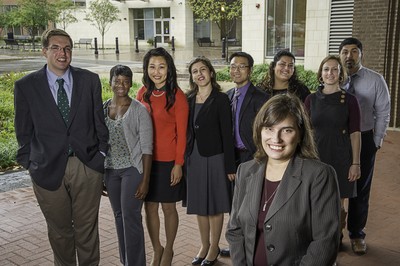CAMDEN — Many low-income immigrants living in New Jersey often confront challenges in trying to access legal services, especially when federal immigration law intersects with state law.
At the Rutgers School of Law–Camden, students are now providing crucial legal counseling and pro bono representation through the school’s new Immigrant Justice Clinic, which aims to help the immigrant population navigate a complex legal system.
“As a public university, we can play a role in responding to the immigrant population in New Jersey, recognizing the special issues that arise when immigrants encounter our child welfare, domestic violence, and criminal justice systems,” says Joanne Gottesman, a clinical professor of law at Rutgers–Camden.

The clinic, which launched in August, is funded by a two-year, $200,000 grant from the United States District Court of New Jersey to “improve the administration of justice in the courts.”
Eight third-year Rutgers–Camden law students, under close faculty supervision, are representing immigrant clients in matters in which immigration law and state law come together, with particular focus on criminal law or family law issues.
“The clinic gives our students the opportunity to interview and counsel clients, draft pleadings, and appear in court. Students take primary responsibility for their cases, so they really get to experience what it feels like to stand in the shoes of a lawyer and make difficult decisions,” says Gottesman, whose research and advocacy has focused on improving the provision of immigration law counseling to immigrant defendants in New Jersey.
Kiomeiry Csespes, a Rutgers–Camden law student from Trenton who is participating in the clinic this semester, says there is a real need for more advocates of immigrants in the legal field.
“Many immigrants who come to this country may not fully comprehend the repercussions immigration laws can have on their lives,” Csespes says. “The clinic allows us to educate the immigrant community so they can make fully informed choices and understand the consequences of those choices.”
In addition to providing direct representation, the clinic engages in efforts to improve the administration of justice in the courts by conducting training and other outreach programs aimed at educating those in the child welfare, criminal justice, and domestic violence systems in New Jersey.
Possible workshops include training social workers on immigration relief available to children who have been abused, neglected, or abandoned; and educating law enforcement agencies about special visas available for victims of crime.
Students are already engaged in providing community workshops and developing materials for undocumented parents on parental rights, and developing materials for criminal defense attorneys on the immigration consequences of crimes so they can more effectively counsel their immigrant clients.
“The Immigrant Justice Clinic provides an opportunity for law students at Rutgers–Camden to learn about immigration law while improving the lives of members of our community,” says Colleen McCafferty, a Rutgers–Camden law student living in Philadelphia. “It is easy to forget that real people are behind the legal issues. The clinical experience helps infuse law school with a real-world perspective; you have clients that you care about and a sense of agency and responsibility that you just can't get in a classroom simulation.”
Students in the clinic are also working closely with national, state, and local partners such as Kids in Need of Defense, the Immigrant Defense Project, and the Camden Center for Law and Social Justice.
The law students have met with individuals in the St. Joseph’s Pro-Cathedral community in Camden who are eligible for temporary relief because they came to the U.S. as children and are now pursuing their education here.
“The experience has been very good,” says Sister Veronica Roche of St. Joseph’s. “There is a very large immigrant population here at St. Joseph’s and it’s extremely valuable for our families to have access to the services Rutgers–Camden provides.”
The clinic also supports the work of Rutgers–Camden’s pro bono projects and other clinics that represent victims of domestic violence, children, and other low income residents of South Jersey.
Each year, clinics at the Rutgers School of Law–Camden handle hundreds of cases with student attorneys providing free legal services to the Camden community.
Other Rutgers–Camden clinical programs include the Child and Family Advocacy Clinic, the Children’s Justice Clinic, the Civil Practice Clinic, and the Domestic Violence Clinic.
Media Contact: Ed Moorhouse
(856) 225-6759
E-mail: ejmoor@camden.rutgers.edu